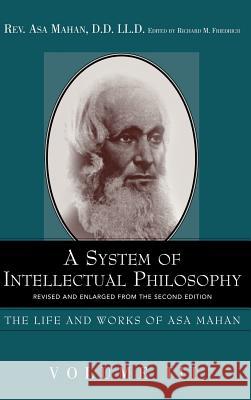A System of Intellectual Philosophy. » książka
A System of Intellectual Philosophy.
ISBN-13: 9781932370386 / Angielski / Twarda / 2005 / 488 str.
The following Treatise presents the sum of a course of Lectures, which, for six or eight years past, I have been in the habit of delivering to successive classes, on the subject of Intellectual Philosophy. One thing I may say in relation to this subject, without boasting. No class have yet passed through this course, without becoming deeply interested in the science of Mental Philosophy; and, in their judgment, receiving great benefit from the truths developed, as well as from the method of development which was adopted. Hence the desire has been very generally expressed by those who have attended the course of instruction, as well as by others who have become acquainted with the general features of the system taught, to have it presented to the public in a form adapted to popular reading. In conformity to such suggestions, as well as to the permanent convictions of my own mind, the following Treatise has been prepared. In preparing it, it has been my aim to reject light from no source whatever from which it could be obtained, and at the same time to maintain the real prerogative of manly independence of thought. Since the publication of the first edition of this work, the author has had the benefit resulting from successive years in teaching the same, and of a careful reading of other works upon the same subject. In this manner, he has been enabled to perceive defects that needed correction in the work, as first presented. The work is now given to the public, as the result of his mature reflections upon this fundamental science. ASA MAHAN (1799-1889) was America's foremost Christian educator, reformer, philosopher, and pastor. He was founding president of two colleges and one university, where he was able to inspire numerous reforms, publish authoritative philosophical texts, and promote powerful revivals like his close associate Charles Finney. He led the way on all important fronts while being severely persecuted. He introduced the new curriculum later adopted by Harvard, was the first to instruct and grant liberal college degrees to white and colored women, advised Lincoln during the Civil War, and among many other remarkable achievements, was a father to the early evangelical and holiness movements.
The following Treatise presents the sum of a course of Lectures, which, for six or eight years past, I have been in the habit of delivering to successive classes, on the subject of Intellectual Philosophy. One thing I may say in relation to this subject, without boasting. No class have yet passed through this course, without becoming deeply interested in the science of Mental Philosophy; and, in their judgment, receiving great benefit from the truths developed, as well as from the method of development which was adopted. Hence the desire has been very generally expressed by those who have attended the course of instruction, as well as by others who have become acquainted with the general features of the system taught, to have it presented to the public in a form adapted to popular reading. In conformity to such suggestions, as well as to the permanent convictions of my own mind, the following Treatise has been prepared. In preparing it, it has been my aim to reject light from no source whatever from which it could be obtained, and at the same time to maintain the real prerogative of manly independence of thought.Since the publication of the first edition of this work, the author has had the benefit resulting from successive years in teaching the same, and of a careful reading of other works upon the same subject. In this manner, he has been enabled to perceive defects that needed correction in the work, as first presented. The work is now given to the public, as the result of his mature reflections upon this fundamental science.ASA MAHAN (1799-1889) was Americas foremost Christian educator, reformer, philosopher, and pastor. He was founding president of two colleges and one university, where he was able to inspire numerous reforms, publish authoritative philosophical texts, and promote powerful revivals like his close associate Charles Finney. He led the way on all important fronts while being severely persecuted. He introduced the new curriculum later adopted by Harvard, was the first to instruct and grant liberal college degrees to white and colored women, advised Lincoln during the Civil War, and among many other remarkable achievements, was a father to the early evangelical and holiness movements.











